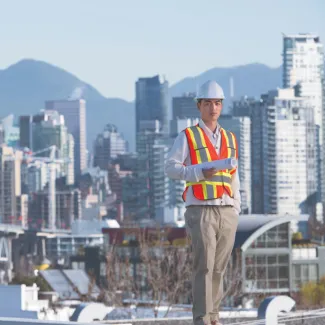An interdisciplinary approach for city planning

In July 2022, we spoke to Amy Kim (Associate Professor in Civil Engineering) and Martino Tran (Associate Professor and Canada Research Chair in the School of Community and Regional Planning) who, at the time were named co-directors of the Master of Engineering Leadership (MEL) in Urban Systems. Read on to learn about the goals of the MEL in Urban Systems program and how its graduates are making a difference.
What excites you about this program?
Amy Kim (AK): The MEL in Urban Systems is doing something ambitious: bringing together professionals with diverse perspectives and backgrounds and asking them to think in a systems way rather than in terms of their individual specializations. Our students are not only trained to work with complex infrastructure systems but also to build the communication and business skills to take on key leadership roles in the future.
This mindset is what is needed to work through the complex urban challenges that we don’t yet have solutions for, but so desperately need.
Martino Tran (MT): Since the beginning of the program in 2015, our advisory group of representatives from industry and government have consistently told us they’re looking for professionals with technical expertise who are also able to communicate and interact effectively across disciplines and domains.
The planning and engineering work being done in our cities – whether that’s transportation systems or climate-resilient infrastructure – demands the input of professionals with different types of expertise, and it needs people who are able to move fluidly across disciplines. Our program develops these kinds of professionals.
What makes the MEL in Urban Systems unique?
AK: The interdisciplinary cohort is a unique strength of this program. I love the diversity of students who choose the MEL in Urban Systems and the range of professional experiences they bring.
Looking ahead, I want to make sure this program continues to attract students who are passionate about urban infrastructure systems and committed to being change-makers.
MT: We create many opportunities for our students to learn how to work effectively on interdisciplinary teams. Most classes require students to complete group projects that are developed in partnership with external clients.
Students work with professionals from other disciplines while gaining hands-on experience doing applied project work, with real milestones and real deliverables for stakeholders.
[You can read about some past projects, including creating a streetlight asset management plan for the city of Surrey, developing policy recommendations for UBC on designated smoking areas, and developing design concepts for a mixed-use neighbourhood in Edmonton.]
How do you see the program evolving?
AK: Short term, I’ll be focusing on getting to know the students and the program. We’ll also be working with the Industry Advisory Group on integrating their perspectives on how the program can meet the changing needs of employers in this new COVID (or post-COVID) world. MT: I was one of the original co-directors when the program first launched in 2015 and it’s exciting to be back again in a leadership role.
I’m heartened to see the growth of a strong network of MEL alumni who are making a difference in industry, government and NGOs.
They can help us make sure we are staying at the cutting edge of the field and that our graduates continue to meet industry needs. Looking ahead, we’re interested in attracting more students to our program, including students who want to take our part-time option offered over 24 months.
This is a great choice for local professionals who want to keep working while gaining new skills and knowledge.
Anything else?
MT: Our cities face two broad and interconnected challenges: climate change and issues of social equity. Cities are the places where we will either exacerbate these challenges or contribute to addressing them.
There’s a critical need for professionals who want to get into leadership positions to take that charge forward. If you are passionate about trying to make a difference and want to deploy your technical and communication skills to do so, come talk to us!
